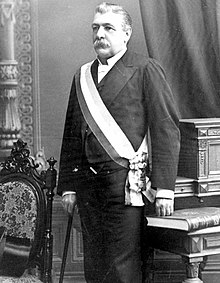Domingo Santa María
| Domingo Santa María | |
|---|---|
 |
|
| 10th President of Chile | |
|
In office September 18, 1881 – September 18, 1886 |
|
| Preceded by | Aníbal Pinto |
| Succeeded by | José Manuel Balmaceda |
| Personal details | |
| Born |
August 4, 1825 Santiago, Chile |
| Died | July 18, 1889 (aged 63) Santiago, Chile |
| Political party | Liberal |
| Spouse(s) | Emilia Márquez de la Plata |
Domingo Santa María González (August 4, 1825 – July 18, 1889) was a Chilean political figure. He served as the president of Chile between 1881 and 1886.
He was born in Santiago de Chile, the son of Luis José Santa María González and Ana Josefa González Morandé. He completed his early studies in the Instituto Nacional, and graduated as a lawyer from the Universidad de Chile in 1847. Soon after, he became a clerk at the Justice Ministry, where he rose to become Official Mayor. At the same time, he became the secretary of the Sociedad del Orden (Society for Public Order), a liberal club opposed to the conservative party.
At the age of 23, he became Intendant of Colchagua. His active intervention in rigging elections in favor of the conservatives made him into the principal target of the opposition. Two years later, he was asked to resign by his superiors. His refusal sparked his destitution by Manuel Montt. At that point, he joined Montt's opposition and joined the liberal party, participating actively in the 1851 revolution. In 1856, during the clash between the government and the church due to the "verger problem" he joined the opposition to the church, a position that would eventually carry to the extreme during his administration.
In 1858, he was elected to the lower house of congress and a year later, he was forced into exile in Europe as a result of the 1859 revolution. After his return, he remained aloof from politics. He became an attorney of the Appellate Court of Santiago. During the Chincha Islands War, he became a champion for Americanism and his articles made him a public figure. After the war, he returned to politics as member of the lower house, raising to become vice-president of the chamber. He was also a diplomat and was named full member of the Appellate Court and a State Counsellor. In March 1879, he was elected senator. When the War of the Pacific broke out, he was named Minister of Foreign Affairs and soon after, Minister of the Interior. From that position, he had almost total control over the direction of the war and as such became one of the main people responsible for the victory.
...
Wikipedia
